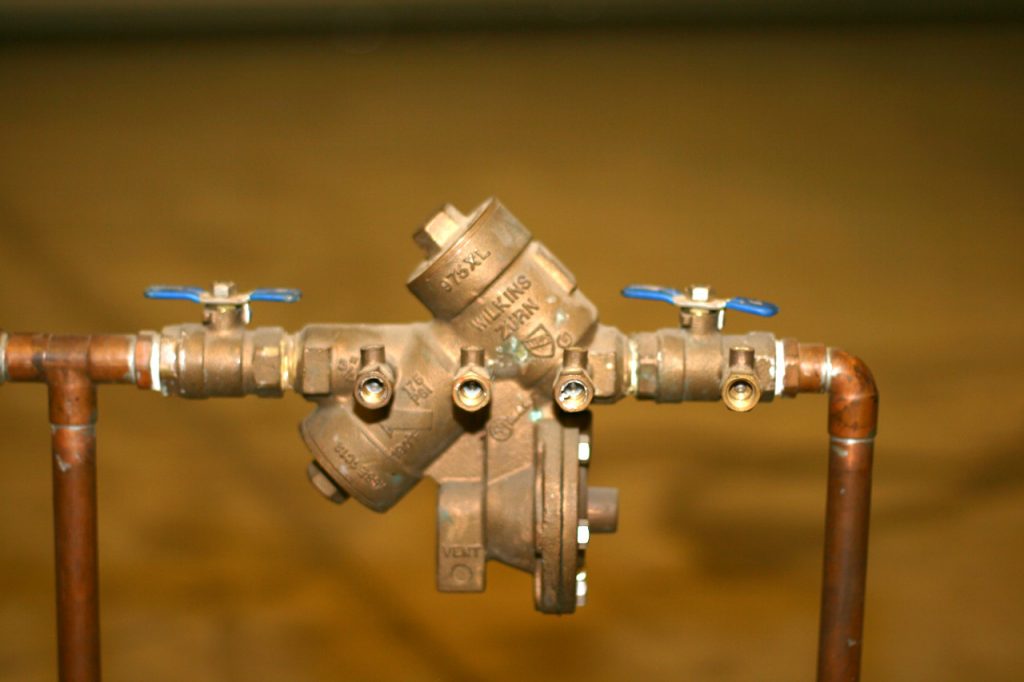What IS backflow and why do you need to test for it?
Spring has sprung but you don’t want to spring a leak! That’s why as you’re doing your spring cleaning each year, one task may want to add to the list is testing your backflow assemblies at your properties. You may have heard of backflow prevention but first, what is backflow?
Backflow is the undesirable reversal of flow of nonpotable water or other substances through a cross-connection and into the public water system (potable water). There are two types of backflow – backpressure and backsiphonage. A backflow system is designed to protect the potable water from contamination, which could occur if the pressure exceeds potable water pressure over a cross-connection where one (or more) of the check valves fail.
In water supply systems, water is normally maintained at a significant pressure to enable water to flow from the tap, shower, or other fixture. Water pressure may fail or be reduced when a water main bursts, pipes freeze, or there is unexpectedly high demand on the water system (for example, when several fire hydrants are opened).
Reduced pressure in the pipe may allow contaminated water from the soil, from storage, or from other sources to be drawn up into the system.
What about backflow prevention?
Backflow prevention devices are used to protect potable water supplies from contamination or pollution due to backflow. However, backflow assemblies and devices have parts that can break down and wear out, just like the parts on your car. That’s why you need to add backflow prevention testing to your spring cleaning!
Additionally, to ensure these systems remain functional, and thus local water supplies are protected, cities and county government utilities often require that residential and commercial customers conduct regular backflow prevention testing to ensure the backflow assemblies are working properly.
These laws and local regulations requiring regular backflow testing are intended to help ensure the safety of our drinking water by ensuring property owners (homeowners and businesses) all regularly conduct backflow prevention testing.
Why is backflow prevention testing required in Tallahassee?
The City of Tallahassee has adopted backflow prevention testing regulations to ensure we our community’s drinking water remains safe. The city’s Rules and Regulations for Backflow Prevention aims to protect the City of Tallahassee and its consumers from those water-using facilities which could possibly harm the quality and safety of the City of Tallahassee water supply by backflow conditions through cross connections.
By having the backflow assemblies tested annually, you will help to ensure the drinking water remains safe.
Who can I contact to help me with this process?
Tall Timbers offers backflow prevention testing with the same objective of keeping your drinking water safe! We provide conveniently scheduled backflow testing in Tallahassee and the surrounding area.
Tall Timbers President, Doug Banks is a University of Florida, TREEO Certified Backflow Assembly Tester, Florida Licensed Plumbing Contractor, as well as holds a Florida Fireline Contractor License. This enables us to test, repair and replace backflow valves.
Tall Timbers can help with you check an important item off your spring cleaning list by having a certified specialist conducts your backflow prevention testing and ensuring Tallahassee-area residents and businesses are complying with local requirements to ensure our local drinking water remains safe and clean!
Call us today to schedule your backflow testing appointment! You can schedule a backflow testing appointment by calling 850-251-7203 or by filling out our online appointment request.
